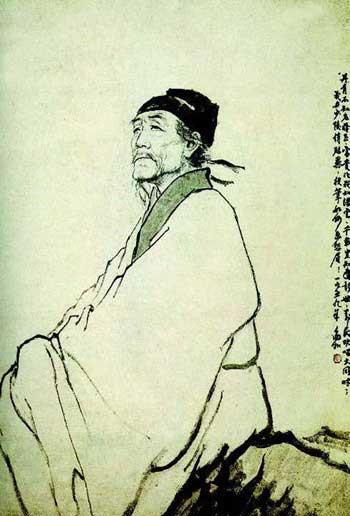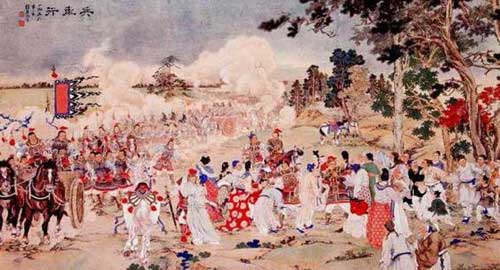- +86-13267351235
- info@globalstourtravels.com
Realism is the profoundest and longest tradition of Chinese poetry. In the Tang Dynasty, Du Fu (712-770) made this tradition shine like never before. Du Fu's poetry, with his real feelings, close observations and gloomy and sincere emotions, reflects almost all major social and political events from the late Tianbao Period of the Tang Dynasty to the Dali Period, especially the great traumas caused by the turbulent times to people's livelihood, expresses his closest concern, and shows his indignation unequivocally. In terms of poetic art, Du Fu represented the greatest previous accomplishments, stood at a new height of the times, inherited from predecessors, inspired those who came later, achieved mastery through comprehensive studies, and created a unique style. In the history of Chinese literature, Du Fu's poetry deserved to be called "poetic history" and "poet sage." Now more than 1,400 poems by Du Fu exist. Collected Works of Du Fu with Notes by Chou Zhaoao (1638-1717), a scholar who lived in the late Ming Dynasty and early Qing Dynasty, is a detailed variorum existing today.

Figure of Du Fu, painted by contemporary Jiang Zhaohe
Du Fu, with the courtesy name of Zimei, called himself "Du Ling the Commoner'1 and was often called "Du Shaoling." In his late years, he worked as an acting councilor at the Ministry of Works temporarily; therefore, later people called him "Du of the Ministry of Works." When he was young, Du Fu studied hard, began his grant tour of more than ten years at the age of 20, greatly broadened his vision, and accumulated abundant life experience. When he was high-spirited and had bright prospects in his middle age, Du Fu cherished the political ideal of "helping the monarch surpass Yao and Shun and renewing the glorious customs" in vain, lived with difficulties in Chang'an for ten years, could not dedicate himself to the service of his country, and could not advance. The difficulties in life made Du Fu determined to express his thoughts with poems, write down his worries about his country and people and realize great ambitions and strategies. In this period, he wrote famous poems such as Soldiers' Song, A Song of Fair Women and Expressing Feelings in Five Hundred Words on the Way to Fengxian County from the Capital, and their characteristic of "poetic history" was increasingly clear. The An-Shi Rebellion that broke out in 755 caused great traumas to the society, and brought deeper distress and grief to Du Fu. He fled from calamities, avoided disasters, had no permanent residence, and wandered from place to place. Painful experiences let him get closer to people at the bottom and social reality and see through the society more clearly. Many of his classic poems such as "Three Officials," "Three Departures," Qiang Village, A Spring View, Washing Weapons and Horses and The Northward March were all written in this period. From 759 to his death, Du Fu always wandered in the southwest. In this period, Du Fu's poetic thought was gloomier, and his art was more sophisticated. His early poems were mostly archaic Yuefu poems, but in this period he obviously wrote more seven-character metrical poems and made major accomplishments. My Thatched Hut Wrecked by the Autumn Wind, On Hearing Government Troops Recapture Henan and Hebei, The Temple of the Premier of Shu, Climbing the Height and the eight poems in Autumn Meditations are all important representative poems created Du Fu in the late period.
The poems created by Du Fu, the most famous realistic poet in the history of Chinese literature, show important and unique ideological characteristics and artistic features.
First, his poems express abundant thoughts, profound views and sharp criticisms. Du Fu was a very ambitious poet. The poem Gazing on Mount Tai written by him in his early years shows the poet's broad vision and the width of his mind:
O peak of peaks, how high it stands!
One boundless green o 'er spreads two States.
A marvel done by Nature s hands,
O 'er light and shade it dominates.
Clouds rise therefrom and lave my breast;
My eyes are strained to see birds fleet.
Try to ascend the mountain s crest:
It dwarfs all peaks under our feet.

The poem's momentum is tremendous! Abundant experience of departures and disturbances, worries about the country and love for people constitute the basis of Du Fu's life and the keynote of his thoughts. "All the years I worried about people" and "I'm willing to dedicate my life to benefit people" fully reflects Du Fu's spirit of actively going into the society, helping rescue the country willingly and pleading in the name of the people, so later people praised him: "All poems written by Shaoling show his worries about the country!" Besides, Du Fu also truly recorded the society and history of that period with his poems, which can be called "poetic history." "Three Officials," "Three Departures," My Thatched Hut Wrecked by the Autumn Wind, On Hearing Government Troops Recapture Henan and Hebei and the eight poems in Autumn Meditations all depict real scenes of social life, expose the dark side of the society, and criticize rulers' dissolution and fatuity. Every sigh of the poet originated from his personal experience of real life.
Second, Du Fu's poems have their own style, manifesting the power of the poet's personality, firm writing style and unbending will. His famous poem Spring View is one example.
Though a country be sundered, hills and rivers endure;
And spring comes green again to trees and grasses
Where petals have been shed like tears
And lonely birds have sung their grief.
After the war-fires of three months,
One message from home is worth a ton of gold.
I stroke my white hair It has grown too thin
To hold the hairpins any more.
Here there are mountains, rivers, grasses, trees, flowers and birds, but the whole poem expresses the poet's grief and indignation about the political situation. The last two lines in particular show the poet's anxious and painful state very vividly. The Temple of the Premier of Shu is another example:
Where is the temple of the famous Premier?
In a deep pine grove near the City of Silk,
With the green grass of spring coloring the steps,
And birds chirping happily under the leaves.
The third summons weighted him with affairs of state
And to two generations he gave his true heart,
But before he could conquer, he was dead;
And heroes have wept on their coats ever since.
The An-Shi Rebellion caused endless disasters. The poet visited the temple of Zhuge Liang in Chengdu, pondered on the past, wrote a poem to express his feelings, and sighed with infinite regret. Fortunately, he was not destroyed by the darkness in front of him or immersed in historical grief, but motivated by his feelings and inspired in gloom.
Third, Du Fu's poems are voluminous and have diverse styles. Du Fu's early poems are mostly five-character archaic poems, and his later poems are mostly seven-character metrical poems. The five-character poems of varying lengths and styles are natural, smooth and not limited to one type, including neat short poems such as Gazing on Mount Tai, Moonlit Night and Spring View and long poems such as Expressing Feelings in Five Hundred Words, The Northward March, "Three Officials" and "Three Departures;" the seven-character poems also include metrical poems featuring rigorous structures, strict antitheses and harmonious rhymes and the so-called irregular works such as My Thatched Hut Wrecked by the Autumn Wind and Washing Weapons and Horses, showing indulgence in neatness and rhymes in unrestraint and fully demonstrating the bearing of a master. Du Fu both narrated and expressed emotions. His scenery description was also outstanding. Climbing the Height is an example:
The wind so swift, the sky so deep, sad gibbons cry; Water so clear and sand so white, backward birds fly; The boundless forest sheds its leaves shower by shower; The boundless river rolls its waves hour after hour. Far from home in autumn, I'm grieved to see my plight; After my long illness, I climb alone this height, Living in hard times, at my frosted hair I pine; Pressed by poverty, I give up my cup of wine.
Looking far at the height and looking down from above, the poet could see various scenes in picturesque disorder in front of him. As the scenes changed, the feelings expressed by the poet also kept pulsating. The whole poem is gloomy and cadent, and can manifest the style of Du Fu's poems very well. "The boundless forest sheds its leaves shower by shower; the boundless river rolls its waves hour after hour" can be called natural lines blending feelings and settings. Later people highly praised this poem as not only the best seven-character metrical poem of the Tang Dynasty, but also the best seven-character metrical poem of all times!
Du Fu's poems are plain but full of ups and downs, lasting forever as the high mountains and long rivers and describing stunning love and hate. Most of them are magnificent and gloomy sentimental poems representing the fascinating peak of poetic perfection!